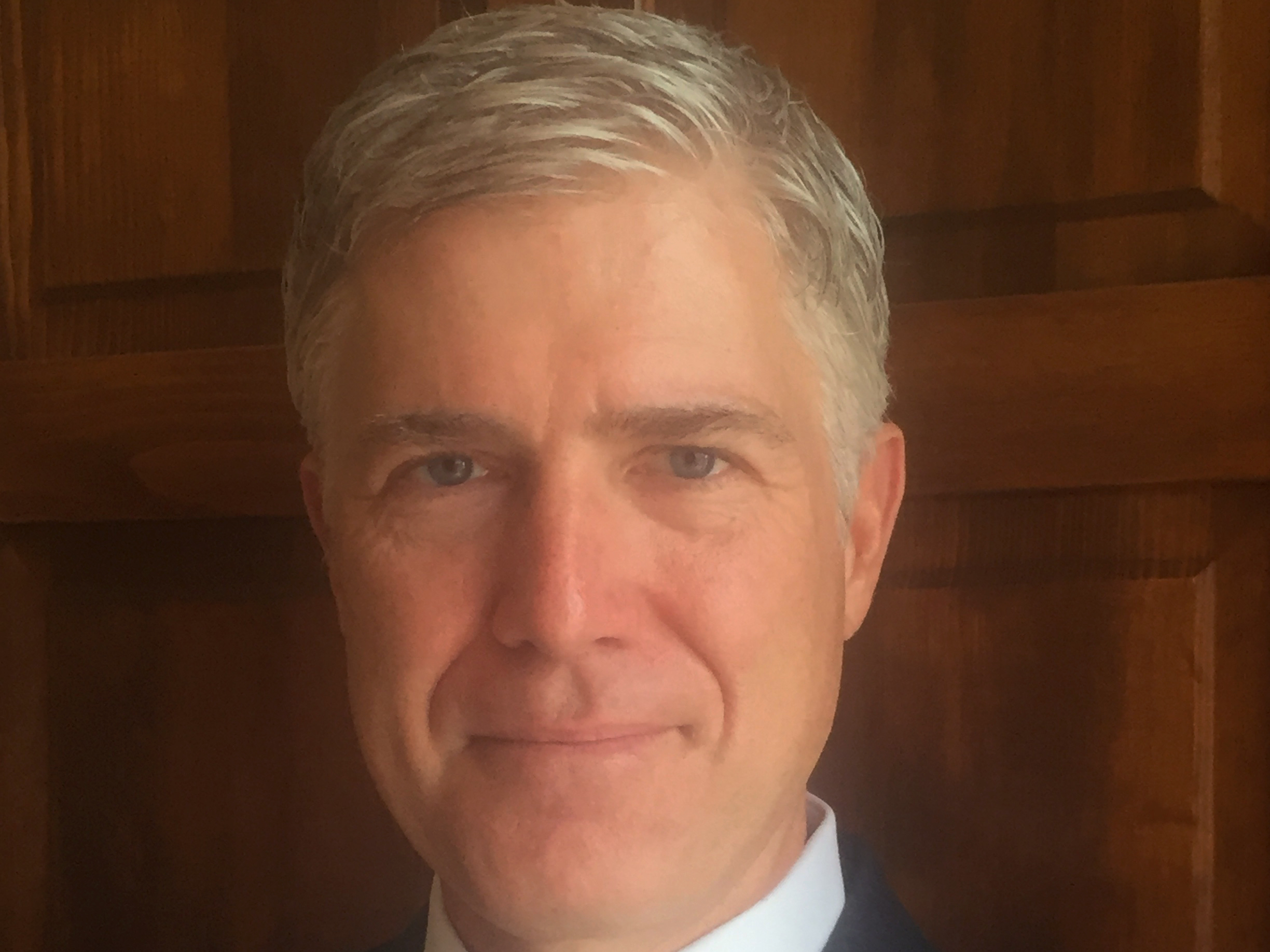President Donald Trump has selected Neil Gorsuch as his nominee for Supreme Court justice.
Trump made the announcement during a Facebook Live event on Tuesday night.
Gorsuch serves on the 10th US Circuit Court of Appeals in Denver, Colorado, and was appointed by President George W. Bush in 2006.
Gorsuch, who at 49 would be the youngest justice on the current Supreme Court bench, comes with a prestigious academic and legal background, as well as staunchly conservative credentials. He, along with conservative judge Thomas Hardiman, was widely anticipated to be one of Trump’s top picks for the seat vacated by Justice Antonin Scalia, who died last February.
Both Gorsuch and Hardiman were brought to Washington, DC, on Tuesday ahead of the announcement, CNN reported.
Trump said during his campaign that he would seek to "appoint judges very much in the mold of Justice [Antonin] Scalia" - a characteristic that Gorsuch appears to have embraced in past remarks.
In a speech to Case Western Reserve University's law school shortly after Scalia's death, Gorsuch praised Scalia for his unyielding textualism - interpreting a law according to its plain text, rather than considering the intent of the lawmakers or the consequences of its implementation.
Gorsuch said Scalia's greatest achievement was perhaps his emphasis on the differences between legislators, who, he said, use the law according to their own morals and ambitions for society's future, and judges, who "should do none of these things in a democratic society."
"Judges should instead strive, if humanly and so imperfectly, to apply the law as it is, focusing backward, not forward, and looking to text, structure, and history to decide what a reasonable reader at the time of the events in question would have understood the law to be," Gorsuch said.
Scalia's method of statutory interpretation was done "correctly" and was undoubtedly a "success," according to Gorsuch, who quoted Scalia as saying: "If you're going to be a good and faithful judge, you have to resign yourself to the fact that you're not always going to like the conclusions you reach. If you like them all the time, you're probably doing something wrong."
Similarly, Gorsuch also supports originalism, meaning he seeks to interpret the law according to the meaning of the Constitution as it was written. Gorsuch would frequently ask his clerks to scour historical sources when a constitutional issue arose in a case, David Feder, one of his former clerks, wrote in a blog post for the Yale Journal on Regulation.
"'We need to get this right,' was the motto - and right meant 'as originally understood,'" Feder said.

'Conservatives will love him'
Gorsuch graduated from Harvard Law School and clerked for Supreme Court justices Byron White and Anthony Kennedy. A Denver native, Gorsuch was appointed in 2006 by President George W. Bush to the federal appeals court for the 10th circuit. He worked in the Bush administration's Justice Department before his appointment.
Like Scalia, Gorsuch has become known for his writing style, which is often infused with his wit and personality. But, in a departure from the famously combative justice, Gorsuch has a reputation for projecting an easygoing demeanor - a trait that could work in his favor during confirmation hearings in which Democrats have vowed to fight "tooth and nail."
"I think the conservatives will love him and the liberals will find very little to fault," Mark Hansen, a former partner of Gorsuch's at Kellogg Huber Hansen, told CNN. "He's an affable, collegial, unpretentious man with a good sense of humor."
Gorsuch is also known for his votes and opinions in favor of religious liberty. In perhaps his most notable case, he sided with claimants Hobby Lobby and Little Sisters of the Poor, who argued that their religious beliefs were violated by the Affordable Care Act's contraceptive mandate.
The government must not force those with "sincerely held religious beliefs" to be complicit in "conduct their religion teaches to be gravely wrong," Gorsuch wrote in his opinion.
The case went to the Supreme Court in 2014. In a 5-4 vote, it came to the same decision as Gorsuch.
In criminal law, too, Gorsuch applies a textualist interpretation and often sides with defendants over prosecutors in an effort to avoid criminalizing conduct that could potentially be innocent.
In one 2013 case, for instance, Gorsuch upheld a lower court's ruling that a police officer in Lafayette, Colorado, who used a stun gun on 22-year-old Ryan Wilson, who died from the incident, had qualified immunity, The Denver Post reported.
According to Gorsuch, all officers were protected under broadly applied qualified-immunity laws, with the exception of "the plainly incompetent or those who knowingly violate the law."
Gorsuch has also been a staunch opponent of what he calls "executive overreach," a position that could appease many Republicans who criticized the Obama administration's use of executive orders to cut through congressional gridlock, while also reassuring Democrats worried about the ramifications of Trump's executive orders.
Executive bureaucracies, according to Gorsuch, "concentrate federal power in a way that seems more than a little difficult to square with the Constitution of the framers' design."
"Maybe the time has come to face the behemoth," he wrote.
In keeping with Republican tradition, Gorsuch leans in favor of state power over federal power - an approach that can be challenging in civil-rights cases that frequently revolve around the power of "rogue" state laws, Justin Marceau, a University of Denver law professor, told The Denver Post.
"We would see a judge who, while perhaps not as combative in personal style as Justice Scalia, is perhaps his intellectual equal," Marceau said, "and almost certainly his equal on conservative jurisprudential approaches to criminal justice and social justice issues that are bound to keep coming up in the country."

